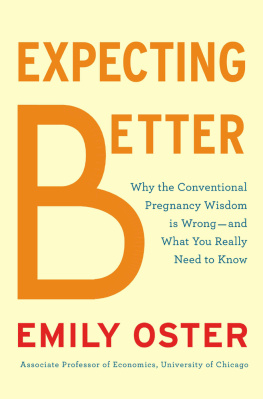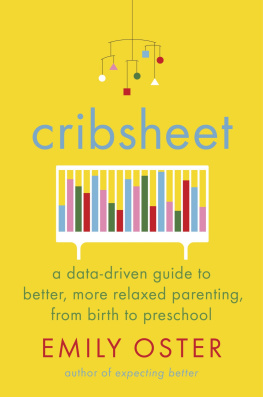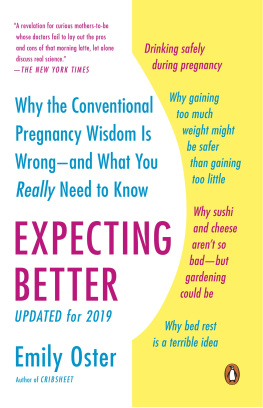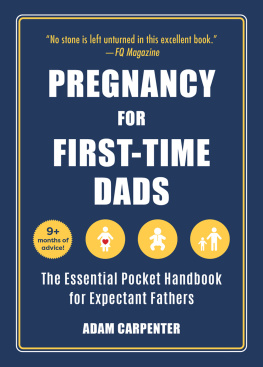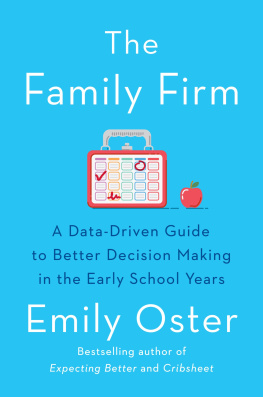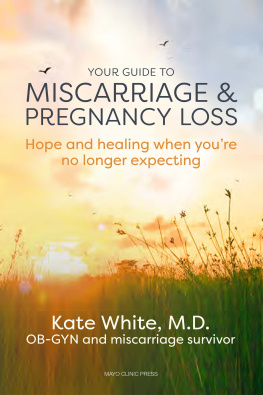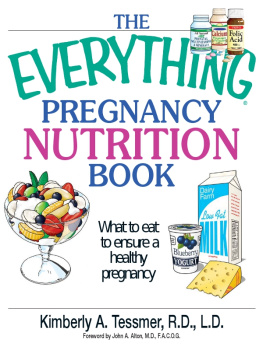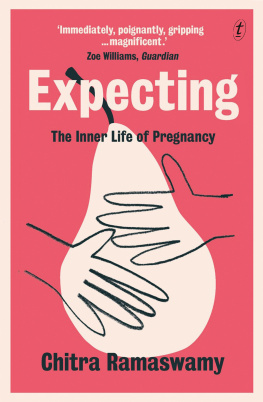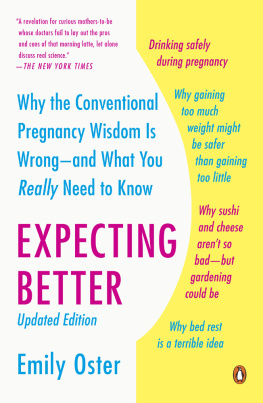Expecting
Better
Why the Conventional Pregnancy Wisdom Is Wrongand What You Really Need to Know
Emily Oster
THE PENGUIN PRESS
New York
2013
THE PENGUIN PRESS
Published by the Penguin Group
Penguin Group (USA) Inc., 375 Hudson Street,
New York, New York 10014, USA

USA Canada UK Ireland Australia
New Zealand India South Africa China
Penguin Books Ltd, Registered Offices: 80 Strand, London WC2R 0RL, England
For more information about the Penguin Group visit penguin.com
Copyright Emily Oster, 2013
All rights reserved. No part of this book may be reproduced, scanned, or distributed in any printed or electronic form without permission. Please do not participate in or encourage piracy of copyrighted materials in violation of the authors rights. Purchase only authorized editions.
Library of Congress Cataloging-in-Publication Data
Oster, Emily.
Expecting better : Why the Conventional Pregnancy Wisdom Is Wrongand What You Really Need to Know / Emily Oster.
pages cm
Includes bibliographical references and index.
ISBN: 978-1-101-61793-9
1. PregnancyHealth aspects. 2. Pregnant womenHealth and hygiene.
3. Prenatal care. I. Title.
RG525.O87 2013
618.2dc23
2012039780
Book design by Gretchen Achilles
To my sweet Penelope, who inspired this book,
and to my mormor,
who would have loved to meet her.
Acknowledgments
Thank you, first, to my wonderful book team. My agent, Suzanne Gluck, without whom this project definitely would not have gotten past chapter 1 and who tells me straight up when its not quite there yet. Ginny Smith is some kind of secret genius editor who got this turned into a real book when I wasnt even looking. Thanks to her, Ann Godoff, and the whole team at Penguin for enormous support, genius title creation, and all sorts of other things.
Huge thank you to Jenna Robins, who read everything first, rewrote most of it, made me sound like less of an economist, and without whose help I never would have gotten off the ground.
Emily L. Seet, MD, was an incredible medical editor (although any mistakes remain very much my own). Emily Carmichael created lovely graphs with little guidance. Jen Taylor provided invaluable contracting assistance.
I am grateful to all my ladies, most of whom helpfully got pregnant at the same time and shared their stories (sometimes without knowing theyd be book fodder): Yael Aufgang, Jenny Farver, Hilary Friedman, Aude Gabory, Dwyer Gunn, Katie Kinzler, Claire Marmion, Divya Mathur, and, most especially, Jane Risen, Heather Caruso, Elena Zinchenko, and Tricia Patrick.
Many colleagues and friends supported the idea and reality of this book at various stages. Including but by no means limited to: Judy Chevalier, John Friedman, Matt Gentzkow, Steve Levitt, Andras Ladanyi, Emir Kamenica, Matt Notowidigdo, Dave Nussbaum, Melina Stock, Andrei Shleifer, Nancy Zimmerman, and the More Dudes.
Actually putting the time into writing this would not have been possible without the help of many, many people in running my household. Most important of all, Mardele Castel, who has been Penelopes Madu since day one, who makes Penelope happy and her parents relaxed, and who, very simply, makes it all work.
Im lucky to have an incredibly supportive family. Thank you to the Shapiros: Joyce, Arvin, and Emily. To the Fairs and Osters: Steve, Rebecca, John, and Andrea. And to my parents: I couldnt ask for better ones; Penelope is lucky to have you as her mormor and Grandpa Ray. Mom, I hope you feel the ninety-six hours of labor was worth it.
Finally, thank you to Jesse and Penelope, who, it goes without saying, were essential. You two make me happy every day. Penelope, you have the absolute best dad. I love you.
Introduction
In the fall of 2009 my husband, Jesse, and I decided to have a baby. We were both economics professors at the University of Chicago. Wed been together since my junior year of college, and married almost five years. Jesse was close to getting tenure, and my work was going pretty well. My thirtieth birthday was around the corner.
Wed always talked about having a family, and the discussion got steadily more serious. One morning in October we took a long run together and, finally, decided we were ready. Or, at the very least, we probably were not going to get any more ready. It took a bit of time, but about eighteen months later our daughter, Penelope, arrived.
Id always worried that being pregnant would affect my workpeople tell all kinds of stories about pregnancy brain, and missing weeks (or months!) of work for morning sickness. As it happens, I was lucky and it didnt seem to make much difference (actually having the baby was another story).
But what I didnt expect at all is how much I would put the tools of my job as an economist to use during my pregnancy. This may seem odd. Despite the occasional use of Dr. in front of my name, I am not, in fact, a real doctor, let alone an obstetrician. If you have a traditional view of economics, youre probably thinking of Ben Bernanke making Fed policy, or the guys creating financial derivatives at Goldman Sachs. You would not go to Alan Greenspan for pregnancy advice.
But here is the thing: the tools of economics turn out to be enormously useful in evaluating the quality of information in any situation. Economists core decision-making principles are applicable everywhere. Everywhere. And that includes the womb.
When I got pregnant, I pretty quickly learned that there is a lot of information out there about pregnancy, and a lot of recommendations. But neither the information nor the recommendations were all good. The information was of varying quality, and the recommendations were often contradictory and occasionally infuriating. In the end, in an effort to get to the good informationto really figure out the truthand to make the right decisions, I tackled the problem as I would any other, with economics.
At the University of Chicago I teach introductory microeconomics to first-year MBA students. My students would probably tell you the point of the class is to torture them with calculus. In fact, I have a slightly more lofty goal. I want to teach them decision making. Ultimately, this is what microeconomics is: decision sciencea way to structure your thinking so you make good choices.
I try to teach them that making good decisionsin business, and in liferequires two things. First, they need all the information about the decisionthey need the right data. Second, they need to think about the right way to weigh the pluses and minuses of the decision (in class we call this costs and benefits) for them personally. The key is that even with the same data, this second partthis weighing of the pluses and minusesmay result in different decisions for different people. Individuals may value the same thing differently.
For my students, the applications they care about most are business-related. They want to answer questions like, should I buy this company or not? I tell them to start with the numbers: How much money does this company make? How much do you expect it to make in the future? This is the data, the information part of the decision.
Once they know that, they can weigh the pluses and minuses. Here is where they sometimes get tripped up. The plus of buying is, of course, the profits that theyll make. The minus is that they have to give up the option to buy something else. Maybe a better company. In the end, the decision rests on evaluating these pluses and minuses

